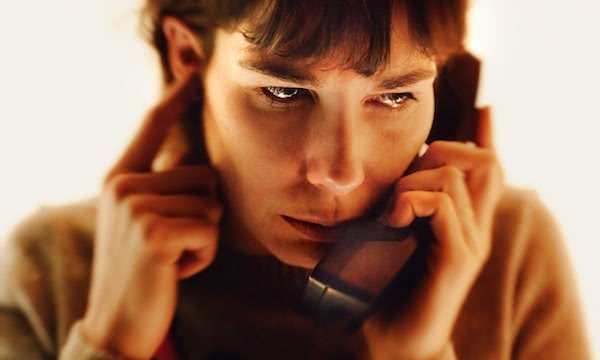Much of Sydney Festival’s La Voix Humaine is based on the hilarity of translation and the enduring appeal of Jean Cocteau’s self-destructive script. Halina Reijn, who plays the production’s only character, is an insightful actress who’s as engaged in the relationships between audience and performer as she is between character and self. She speaks very openly of the strange loneliness that comes with touring a successful production, compounded by the fact she is entirely alone onstage in front of an audience that must read her dialogue subtitled.
Theatre is an exercise in voyeurism. I’ve never been one for productions that break the fourth wall with some tired, knowing wink to the artifice of it all. Instead, the most memorable are those that invite the audience to intimacy without acknowledging their presence. Reijn strikes a precarious balance in this regard, presenting us with a lone woman behind a glass wall pleading with her unheard boyfriend down the telephone. We witness something private, yet there is a conspicuous divide between us. It is both fascinating and coolly observant.
“It’s very lonely,” Reijn says, “and I’ve been doing it for so long. You get to see the world, but you’re very alone. To be onstage by yourself is a strange feeling. One part of me likes it because I’m totally in control and sometimes I find it hard to play in a team, you know? But then I also love playing off other actors. I love the chemistry, I love the energy and the danger of working with people onstage, [not knowing] how they’ll surprise me. It has two sides.”
Dealing with the isolation and vulnerability of performing onstage alone is a difficult task at the best of times. Reijn’s role is made all the more demanding given that she needs to convince the audience of her sincerity and emotion while responding to a voice that only exists inside her head. “I think it proves why it’s such an established play,” she says. “You don’t know what the guy is saying, so the audience must use their imagination. It really fascinates me. For me it’s very important to channel real emotions that could be drawn from two or three guys, it depends where I am in my life. So I will have different guys in my head, maybe even in the course of one show.” She laughs, “It depends on how many men I hate at the moment.”
Without having seen the play, I suggest that one of the reasons for the great success it has been enjoying is precisely that; by having one end of the conversation hidden, the audience is left to project themselves into the empty space and engage in the performance with their own voices, their own words. “It’s another strength of the play,” Reijn says referring to Cocteau’s script rather than her own performance in it. She does this often despite the almost universal praise she has been awarded for the role.
Knowing she will be performing in Dutch before an English-speaking audience, I close by asking if she’s concerned that the presence of subtitles might prove a distraction for people. “You do feel it’s harder to grab the audience,” she says. “On the other hand, because they get to read the lines they get to really follow your performance. I’ve performed a lot of plays all over the world and sometimes I really hate subtitles. But here, it works. I’ve also had a whole audience of people wearing headphones while someone simultaneously translates the whole thing. That was a crazy experience.”
BY ADAM NORRIS
La Voix Humaine presents at Carriageworks for Sydney Festival 2014 from January 9-13.

































